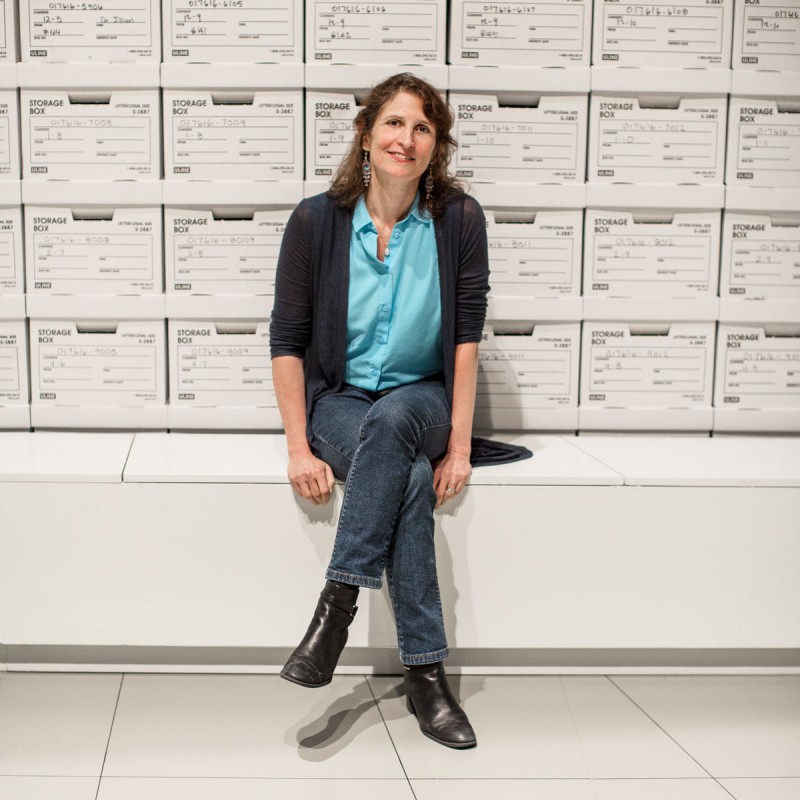An Interview with Deborah Zoe Laufer
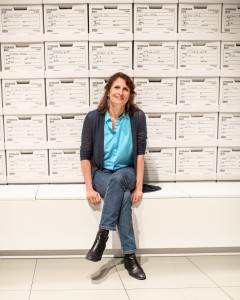
Written By Victoria Myers
Photography by Emma Pratte
September 3rd, 2015
“I would like to spend a good deal of my day every day with some creature who is not human. I grew up in the woods and I raised hundreds of animals. That was my childhood. That’s a big part of who I am. Conversing on a non-verbal level, communing with animals, gives me great joy,” playwright Deborah Zoe Laufer told us at the end of her interview. This bit of information seemed like a delightful contrast as we talked to Deborah at the Duke on 42nd Street where her new play, Informed Consent, a co-production between Primary Stages and Ensemble Studio Theatre, is currently playing. Informed Consent was inspired by a real court case between a Native American tribe and a scientist over the use of their blood for scientific research. Of course, the play deals with so much more than that—the intersection of science and faith, what makes us who we are—that perhaps it should be no surprise that the writer of the piece draws inspiration from nature. Deborah’s other plays include End Days, Leveling Up, and Sirens (to name a few) and have been produced at Steppenwolf, Cincinnati Playhouse, and Actor’s Theatre of Louisville (to, again, name just a few). She is the recipient of the Helen Merrill Playwriting Award and a Lilly Award. We spoke to her about Informed Consent, her process as a writer, and much more.
(i.) Present
Informed Consent deals with a number of things, including the idea of challenging creation myths and how that ties into identity. Why was that interesting for you to explore?
A lot of my plays deal with where science and religion bump up against each other. I’m just fascinated by what people believe. In many cases, people are taught something from the time they’re children—a religion or faith—and they just grow up and accept it and don’t challenge it. But frequently people choose what they’re going to believe. I find real wonder and awe and comfort in the ideas that science presents, but I take a lot of that on faith. I couldn’t actually tell you how gravity works. I have read several theories. But I chose to believe in those things.
It’s interesting in terms of identity and what makes us who we are: science, biology, culture, society, how society interprets things.
Part of what I didn’t know when I started writing this is that this was a landmark case. Before that, informed consent was mostly about bodily harm, and this was about psychological harm and emotional harm because this tribe’s creation story was put into question. It’s taught in schools because it changed the way informed consent is now addressed. It’s a really interesting case because part of it is that it takes so much to know another culture’s point of view. It takes so much more than filling out a form. It takes real time, interest, and commitment. And as more and more things can be learned through genomics, it’s going to be a real effort to get people to agree to something where they don’t even know what the ramifications will be.
(ii.) Research
I read that you did a lot of research for this play. What was your process like for then putting that information in the play? How did you get it to feel organic and not something just layered on top?
Yeah, it’s really hard. The play is probably 300 pages if I put it all together. I’ve just cut and cut and cut anything that wasn’t absolutely essential to it. And part of the problem in doing research is that I find so many things fascinating that I want to slam in there that don’t necessarily fit. I was listening to these talks about how there’s no genetic marker to race and I thought, “That has to be in the play.” So I put everything I’ve learned out there and then carved out what’s not the play. And there are talks—she [the protagonist, Jillian] gives lectures—which I always feel like is a bit of cheat, but in order to set up her perspective on the world, which is kind of extreme, I needed to start with those talks.
When dealing with a subject that the audience might not know a lot about, how did you balance theme vs. plot? How did you make sure the audience could follow the plot but not get distracted having to listen to details of the science and then miss the larger story?
I really played a lot with form matching content in this play. There’s a chorus of storytellers. And the play has changed so much. In an earlier draft, there were actually choral sections where different stories about life were woven into the play, and I actually might put that back in. It’s going to have another production soon. I might actually make it a two act play again and put those sections back in. So one of the things I was dealing with was form and the play itself being a form of storytelling, and who are we, anyway—are we our identity, are we our genome? Now that we can learn so much about our genome, does it identify us? So, having storytelling and having the whole thing be a story that she’s telling from her memory that is fading frames the play. I’ve never had a chorus before. It was very freeing.
It triggers the audience to know, “Oh this is the type of play I’m going to be watching.”
And also, I could move around through time in a way that I haven’t in other plays, because I have someone just saying, “Okay, now this happened,” and I can go back and forth in time however I like since it’s just people telling a story. At one point the cast goes, “You know what? Let’s do that meeting in the bookstore because that would really set up why it came to this point with your husband.” So I just went to the bookstore and I had such a good time with that.
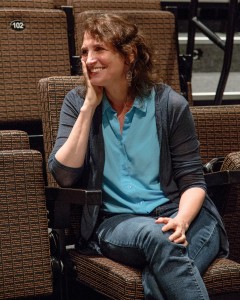
(iii.) Protagonist
Your protagonist is a female scientist, and since this is The Interval, we think that is awesome. It’s always nice to see women with jobs depicted on stage. In writing Jillian, how much did you have to think about what the audience’s preconceived notions or unconscious bias about a female scientist might be?
One of the things that drew me to this story—and it is based on a true story—is that it was actually a female scientist in this case. I hope the audience goes back and forth between absolutely despising her and absolutely loving her. I hope she’s a very complicated character. I really wanted to create a main character who was thorny, and unlikeable at times, and aggressive and not particularly motherly, and all the things that might frequently be ascribed to men and be accepted. I very consciously gave those traits to a woman. One of the things I’m trying to do with this play, in casting it with actors from five parts of the world and saying there’s no such thing as race, is having things come out of people’s mouths that an audience wouldn’t usually expect to come out of those people. I like an audience to have to question their preconceptions and realize that they have biases and be caught off guard again and again, and be like, “I guess I did come in with an idea about what someone who looks like that would say.” Also, reversing gender roles. Part of what I love about theatre, and what it does for me, is that it makes me look at being human anew. I guess the thing I want least is to become complacent and have set ideas that I don’t challenge. I really love to live—as corny as it sounds—the examined life. So, I wanted a play that presented ideas in such a way that people were thrown off-center a bit, and constantly had to reassess where they stood and how they viewed women and different cultures. I think this character would probably be controversial, male or female. She does a lot of questionable things for very strong reasons. She’s one of those people who wants to save the world and wants to save her daughter, but doesn’t necessarily want to make her daughter lunch. She can love the world at large, but can’t necessarily love the people sitting across from her. I find those people really fascinating. Maybe they’re the people who really make big change in the world, but maybe aren’t the people you want to sit and have lunch with.
It’s something we don’t talk a lot about: people who get things done aren’t necessarily going to be ideal in other ways.
I even feel like being in the arts you have to have certain doggedness. If you want to make something, there’s no one who is really dying to have you do it. It has to be sort of a bullhead drive. You have to have a certain amount of fire in your belly.
(iv) Process
What is your process like as a writer? Where do you start—an image, a question?
It’s changed over the years. It used to be through character. I started as an actor. I hope my plays are all character driven, but what I start with now is a big question. Something that’s bothering me, something that I’ve observed, something that I’ve read about, something that I don’t really understand. I want to ask a big question and come away with more questions. I don’t want to ask anything that I can answer in the course of the play. This play, one of the big questions was, “What is identity?” Now that we can know more about our past and possible future through the genome, who are we as people? How much do we want to know about the future, and how much do we have the right not to know? But all of my plays, I like to start with a big question. It keeps me interested if I get off track and keeps me hungry to keep going.
(v.) Themes
Do you see any themes in your work?
Yeah. In most of my plays, people are searching for something by looking outside themselves and their family and loved ones and friends. And ultimately, the characters find what they’re looking for in each other and the simple acts of being together, eating together, playing games, spending time with the people who actually matter.
(vi.) Language
What other areas of culture affect your work?
The fact of the matter is I’m absolutely addicted to storytelling, so I listen to The Moth, This American Life, RadioLab, and TED Talks. Any type of oral storytelling I can get a hold of, I listen all day long as I’m doing things. Those are the things that I find my stories in and the subjects for my plays.
Since you have a whole visual language with playwriting as well, do you think about the visual aspects of things?
I always have strong ideas about a moment that I just would love to see. With End Days, I knew I wanted to have Stephen Hawking on stage and a teenage girl who was finding the reason to live, through him. My idea was that they would have a dance on stage together. That drove the writing of that play all the way through. I usually have a strong image like that. With this play, it takes places right at the edge of the Grand Canyon, and I saw the expanse of the whole Grand Canyon and this woman who was just focused in on a microscope and had no awareness of what was happening outside that microscope.
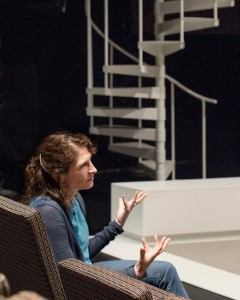
(vii.) Development
You’ve had plays produced all over the country. How has that affected your development as a writer?
I never realized that playwriting would take me all over the country. It’s been one of the real joys of it for me. There are places I might have never gone, but playwriting has taken me. It’s taken me all over the world. So that was a surprise. I don’t know if I find that different parts of the country really respond that differently. In any audience there will be two people who have completely opposing ideas about what they’ve just seen. I’m sure there are differences, but the productions are so different. And seeing the different approaches to the plays is thrilling to me.
What do you think can be done to improve new play development?
I had nine workshops of this play and I would say that is too many. Anyone who said yes, I’d just do a workshop. I’m one of those people who will completely rewrite depending on who is in the room. I will completely rewrite for the actors in front of me. So I have so many versions of this play that it’s actually really confusing at this point. I love working with actors. I love working with designers. My dream would be to have a set of designers who I worked with, and before I even wrote the play we talked about it. Frequently, the playwright is left out of the interaction with designers and I think that’s a real mistake. I think there’s a tremendous loss there, because so much of the storytelling takes place with the design. I’ve had phenomenal experiences with play development. I love getting to be in a room and play with actors and a director. It’s really made a huge difference in my work. I think what would be helpful, as far as women go, is if there was childcare. That’s what I’m pushing for. It’s too late for me, but that’s what would have made the big difference. That’s what makes it easier for men to go sometimes and harder for women.
(viii.) Past
What was the first piece of storytelling that had a major impact on you?
I read obsessively when I was a kid. I lived in a really small town and I read every book in the library. I loved Harriet the Spy and A Wrinkle in Time. When I went back and read A Wrinkle in Time recently, I realized how much it influenced my writing now.
Who were your heroes growing up?
My grandmother was really an inspiration to me. My mother, my grandmother, and I were really close. I wrote letters to her my whole life even though we lived in the same town. When I went to camp, went to college, I wrote tons of letters to her and she wrote tons of letters to me—long, funny letters—and I’d keep every one of them. And then when she got Alzheimers, which is a big part of this play, less and less she was able to keep track, I compiled all of our letters over the years and put them in a book for her to look at. I got so many letters from her that inspired me, and she was one of the inspirations for the play.
When was the first moment you felt like a grown up?
I still don’t feel like a grown up. Having kids, certainly you’re in the position where you’re supposed to be making decisions. Though even as a parent, I’m one of those parents who is actually just good friends with my kids. I was at a pet store with my youngest son when he was about ten, and we were looking at all the pets and thinking about what we’d love to have and he said, “Wouldn’t it be funny if we just bought a puppy and brought it home? What would Mom and Dad say?” and then he went, “Oh wait, you’re Mom.” They’re really my friends. I guess I really parent my plays; I feel like I have to fiercely defend them and nurture them and make sure they make their ways in the world.
Was there a definitive moment you felt like a playwright?
I was an actress and had written one play. I did a play in San Diego, and so my husband and I decided to move to LA. A friend of ours had moved to Montana and said, “There’s a playwriting conference here, send your one play.” I did and I got in. I was shocked. And when I got there, I found out that Marsha Norman was in charge of it. I had no idea. I had no idea there was a program at Juilliard. I had no idea she was in charge of it. We read my play and did some exercises and she said, “You know that you’re a playwright, right?” And I said, “I had no idea I was a playwright till you actually said it to me.” She invited me to Juilliard and changed my life. So I had an actual moment. As ridiculous as it sounds, it took her telling me.
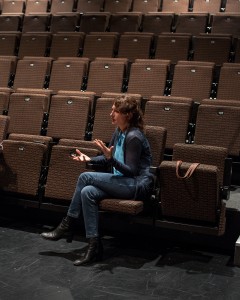
(ix.) Representation
So many of the conversations about gender parity are New York centric. From working in different parts of the country, do you think there’s something being left out of the conversation?
This is only my second production in New York in fifteen years. It is brutally hard for women in New York. I don’t know why that is. I don’t know why we’re judged more harshly, but we are. Around the country, I don’t find that so much. Looking at the numbers, I was shocked. When Julia Jordan did that study—I was part of that study, she sent out my play with a male and female name—and we got back the stats, it was shocking. I didn’t realize how bad it was. And with the work that’s been done and people being vocal, it’s gotten so much better in just a short time. It’s not enough, but it’s hopeful.
Going off of what you just said about women’s work being judged more harshly, do you find work by women is talked about differently than work by men?
It’s so hard to tell. It’s impossible to quantify. Plays are so different. The numbers are so shocking. Why isn’t it 50/50? Most of the ticket buyers are women. I belong to a phenomenal writers’ group and the men are just so much more successful. The men bring in a first draft and it’s produced immediately and the women bring in a first draft and it goes through a year of development. But the men in my writers group, frequently their main characters are women and there’s never a problem with that. And they’re wonderful writers, I wouldn’t take anything away from them, but I don’t understand why it’s not equal.
Do you feel like it’s connected to what Lisa Kron has been talking about in terms of men being rewarded for potential and women for results?
I don’t know. I think we were all raised with the paradigm of thinking it’s a man’s world, and I think both men and women, that’s the lens we’ve learned to look through. And I think it’s going to take a lot of teaching to not think that way.
Do you feel like you have less room for failure?
There’s no way to know. I’ve been pretty lucky. I’ve found homes all over the country. But generally, at the big theatres, I’m in the smaller space. And I think that’s true of a lot of women—even if there are women in a season, they’re relegated to the second space.
And, of course, the childcare issue.
I think it’s the big divider. I think women make choices based on the time they’re going to be away from their children and men have more freedom that way. I have a phenomenal husband who has made a lot of choices in his life so I could have this career. This career that brings in so little money. It’s an act of tremendous generosity and love on his part. If I didn’t have that, I couldn’t have this career. Not everyone is so lucky, so society has to step up.
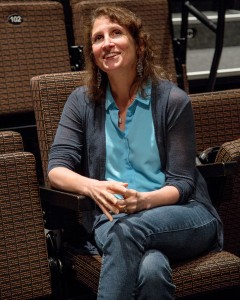
(x.) Future
What’s something you think people can do to improve gender parity in theatre?
I think what people are doing is starting to make a difference. Talking about it. Putting a light on it. Things are shifting so fast in this country and there’s going to be pushback, since whenever there’s change people get terrified and grab onto what they had before. But I feel really hopeful that things are going to change. And childcare will make a huge, huge difference for women.

